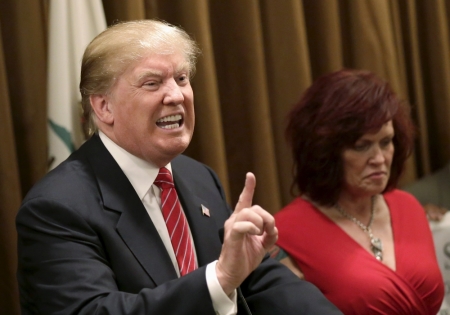Donald Trump and GOP: Evangelicals Don't Support Denigrating Immigrants

As the presidential primary season begins, candidates are looking for ways to stand out. Competing for the harshest rhetoric on immigration seems, sadly, to have become the preferred strategy for several candidates.
After Donald Trump dominated media attention with his immigration policy proposal — calling for mass deportation of all undocumented immigrants, a border wall to be paid for by the Mexican government, a moratorium on legal migration of immigrant workers, and an end to the 14th Amendment's provision of birthright citizenship — several other candidates have attempted to join him in the spotlight by announcing that they, too, support elements of this plan.
We believe candidates who seek to advance their campaigns by denigrating immigrants and proposing unworkable policies are making a grave mistake, both morally and politically.
As Evangelical Christians, our views on a broad range of public policy issues are informed by a biblical anthropology: Scripture teaches us that each human being — whether male or female, already born or still in a mother's womb, of any ethnicity or country of origin — is made in the image of God. Each immigrant, then, is endowed with inherent dignity, and is worthy of our respect.
Most evangelicals are repulsed by language that refers to immigrants in dehumanizing ways, such as when immigrants were compared to "rats and roaches" at a recent candidate forum, when Mr. Trump describes immigrants as "rapists" and "criminals" (despite studies showing that immigrants actually have lower crime rates than U.S. citizens), or when an influential radio host suggests making undocumented immigrants the enslaved property of the state.

We also reject the idea, rooted in scarcity-minded population control ideology, that immigrants are a burden on our country.
For Christians, no human being is a burden: each has been created with unique gifts to serve the common good. And every human soul has value to God, regardless of his or her utility to society. However, economists almost universally affirm that, on the whole, immigrants contribute significantly more to the economic wellbeing of the United States than they take out — though the economic benefits of immigration would be even greater if our laws were reformed, removing restrictions that prevent immigrants from fully thriving.
As people defined by our commitment to the authority of the Bible, Evangelical Christians cannot be reflexively anti-immigrant. After all, Jesus himself was a refugee who, with Mary and Joseph, fled the persecution of a tyrannical government to seek safety in Egypt. The people of Israel, millennia earlier, were mistreated as foreigners in Egypt, and God commanded them, after delivering them from their captivity, to remember that experience as immigrants and to welcome and protect those who came subsequently as immigrants into their land.
As Americans, almost all of us have immigrant roots of our own, and these commands might apply to us as well. We can disagree on the specifics of immigration policy, but we must reject the Darwinist rhetoric that pits classes of people against each other.
We can love and welcome immigrants, as Scripture commands, while also insisting that our government secure our borders and restore order to a system that, after decades of only selective enforcement, no longer honors the rule of law.
This is why many local and national Evangelical churches and organizations are advocating for reforms that would both secure our borders and restore the rule of law by establishing a process for immigrants present unlawfully to come forward, pay a fine as a penalty for having violated the law, and then go through a process to earn eventual legal status and citizenship. This is consistent with the changing attitudes of Evangelicals: a recent poll by LifeWay Research found that about 7 in 10 nationally now support such policies.
The same poll found that fully half of Evangelicals would be more likely to vote for a candidate who advocated a policy of both increased border security and an earned pathway to citizenship for the undocumented, while only 15 percent said a candidate's support for such a policy would make their vote less likely.
Mr. Trump may have the support of a few self-describing Evangelicals in polls, but he and other candidates adopting his rhetoric on immigration are alienating many more.
This is why we think it's short-sighted for candidates to adopt immigrant-bashing rhetoric. Not only will it lead to electoral trouble, it is at odds with our deeply held pro-life beliefs. Our hope and prayer — and that of millions of other Evangelical Christians — is that presidential candidates will see the image of God in the immigrant and work toward building a culture that respects both the rule of law and the worth of the stranger.





















